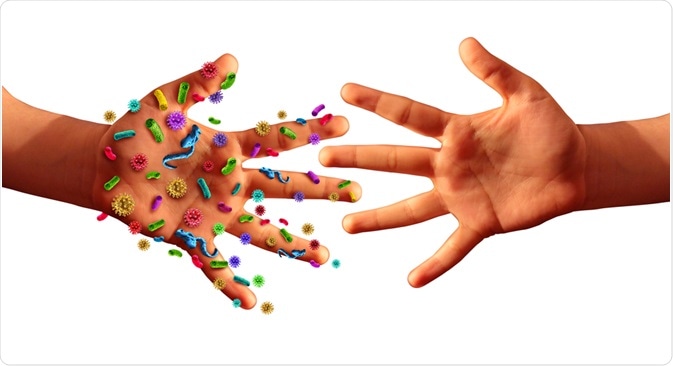COVID-19 has a profound impact on lives across the globe. Not only has it claimed the lives of more than 3 million globally and infected over 150 million, with a significant portion of those now displaying symptoms of ‘Long COVID’ that threaten long term health, the pandemic has also threatened mental health, shaken economies, and increased poverty and hunger.
In reaction to this, scientists and agencies around the world are striving to understand the virus so that it can be controlled better. Part of this approach involves understanding how to prevent transmission. Additionally, emphasis has been put on communicating methods of preventing the spread of infectious disease in general, given that the COVID-19 virus is not the only pathogen capable of initiating a global pandemic.
Here, we discuss the recommended methods of preventing the spread of infectious diseases.

Spread of Disease. Image Credit: Lightspring/Shutterstock.com
Strategies that prevent the spread of infectious diseases
Because infectious diseases can be caused by a wide variety of bacteria, fungi, parasites, and viruses, the routes to infection also vary, which is why there is not one single preventative technique to stopping the transmission of infectious diseases as a whole. However, there is a range of simple strategies that can be incorporated into daily life to protect people from both transmitting and contracting disease-causing pathogens.
Hand washing is a key strategy for preventing the spread of infectious diseases. It is particularly important before, during, and after preparing food, as well as after using the toilet. It ensures that harmful pathogens are not spread from sources that are likely to harbor these pathogens to other areas and food.
Getting vaccinated is another simple and effective strategy for preventing the spread of infectious diseases. Now, in most countries, vaccinations against numerous infectious diseases are widely available. Additionally, many healthcare systems will offer vaccinations to travelers planning to visit areas that are considered high risk for infectious diseases that are not protected against as standard. It is advised that travelers obtain information about countries that they are traveling to beforehand to plan enough time to develop sufficient immunity following vaccination before arrival.
The COVID-19 pandemic has highlighted the need to stay at home if you are feeling unwell. This simple tactic is highly effective at stopping the spread of infectious diseases as it prevents those who are contagious from coming into contact with others. People should avoid work and school or avoid leaving the house at all, particularly if they have a fever, diarrhea, or are vomiting.
Additionally, the COVID-19 pandemic has also emphasized the importance of disinfecting key areas to prevent the spread of pathogens. The kitchen an important area to keep sanitized. Before, during, and after food preparation surfaces should be cleaned to avoid pathogens coming into contact with food that is to be consumed.
Pathogens may come from outside sources as well as from the food itself, such as uncooked meat, poultry, fish, and eggs. Further to this, in terms of protecting oneself self and others from food pathogens, raw and cooked food should be stored separately, and food should be cooked thoroughly, according to instructions.
Safe antibiotic use is another strategy that helps prevent the spread of infectious diseases. Using antibiotics when necessary has the impact of reducing antibiotic efficacy against common infections, therefore, giving these infectious diseases the potential to wreak havoc among the population.
Finally, the transmission of sexually transmitted diseases (STDs) can be prevented via practicing safe sex and getting testing regularly.
Preventing the spread of COVID-19
Scientists have rapidly learned about the nature of the COVID-19 virus. To curb the pandemic, it is vital that we understand not only the nature of the disease and how to treat it but equally as important or arguably more so, is understanding how it spreads so that effective preventative techniques can be implemented.
Across the globe, several basic steps are being enforced to prevent the spread of the disease that can occur directly, from person to person, and indirectly, when a person comes into contact with an infected surface. We know that the virus is spread through the bodily fluids of those infected with the virus, particularly through aerosols (tiny water droplets that are breathed into the air via the nose and mouth).
To prevent the contamination of air in enclosed spaces and surfaces from infected water droplets, the use of masks has been enforced in most shared spaces. However, scientists are continuing to explore the nature of aerosol transmission.
Studies have shown that infected water droplets can linger in the air for significant periods after the infected person has left the space, demonstrating the importance of filtering the air even if people are wearing masks or if the space is considered to have low foot traffic. As more research is conducted, we will be able to develop more effective preventative measures specific to COVID-19.
References:
- Bagchi, S., 2007. WHO regulations to prevent spread of infectious disease. Canadian Medical Association Journal, 177(5), pp.447-448. https://www.ncbi.nlm.nih.gov/pmc/articles/PMC1950178/
- Somsen, G., van Rijn, C., Kooy, S., Bem, R. and Bonn, D. Measurement of small droplet aerosol concentrations in public spaces using handheld particle counters. medRxiv. 2020 DOI: https://doi.org/10.1101/2020.10.13.20211839
- van Seventer, J. and Hochberg, N., 2017. Principles of Infectious Diseases: Transmission, Diagnosis, Prevention, and Control. International Encyclopedia of Public Health, pp.22-39. https://www.ncbi.nlm.nih.gov/pmc/articles/PMC7150340/
Last Updated: Jul 21, 2021